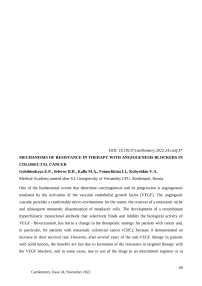Mechanisms of resistance in therapy with angiogenesis blockers in colorectal cancer
Автор: Golubinskaya E.P., Seferov B.D., Kalfa M.A., Fomochkina I.I., Kubyshkin V.A.
Журнал: Cardiometry @cardiometry
Статья в выпуске: 24, 2022 года.
Бесплатный доступ
One of the fundamental events that determine carcinogenesis and its progression is angiogenesis mediated by the activation of the vascular endothelial growth factor (VEGF). The angiogenic cascade provides a comfortable micro-environment for the tumor, the creation of a metastatic niche and subsequent metastatic dissemination of neoplastic cells. The development of a recombinant hyperchimeric monoclonal antibody that selectively binds and inhibits the biological activity of VEGF - Bevacizumab, has led to a change in the therapeutic strategy for patients with cancer and, in particular, for patients with metastatic colorectal cancer (CRC), because it demonstrated an increase in their survival rate.
Короткий адрес: https://sciup.org/148326331
IDR: 148326331 | DOI: 10.18137/cardiometry.2022.24.conf.37
Текст статьи Mechanisms of resistance in therapy with angiogenesis blockers in colorectal cancer
Medical Academy named after S.I. Georgievsky of Vernadsky CFU, Simferopol, Russia
One of the fundamental events that determine carcinogenesis and its progression is angiogenesis mediated by the activation of the vascular endothelial growth factor (VEGF). The angiogenic cascade provides a comfortable micro-environment for the tumor, the creation of a metastatic niche and subsequent metastatic dissemination of neoplastic cells. The development of a recombinant hyperchimeric monoclonal antibody that selectively binds and inhibits the biological activity of VEGF - Bevacizumab, has led to a change in the therapeutic strategy for patients with cancer and, in particular, for patients with metastatic colorectal cancer (CRC), because it demonstrated an increase in their survival rate. However, after several years of the anti-VEGF therapy in patients with solid tumors, the benefits are lost due to formation of the resistance to targeted therapy with the VEGF blockers, and in some cases, due to use of the drugs in an intermittent regimen or in periods of medication interruptions (because of secondary transient effects or choice of strategy), as well as due to the recurrent tumor growth with its rapid vascularization.
The aim of our study was to study the pathogenetic mechanisms of the resistance to therapy with angiogenesis blockers in colorectal cancer.
Patients and methods . Our sampling covered 263 patients with colorectal carcinoma divided into 2 groups: group 1- mCRC (metastatic) n=132; group 2 - nmCRC (non-metastatic) n=131. Material for the study was represented by tumor tissue fragments obtained in surgery for their subsequent histological and immunohistochemical studies (IHC) with markers CD4, CD8, CD163, iNOS, TNFa, HIFa, VEGF-A, ANG1, ANG2, TIE2; peripheral blood samples for enzyme immunoassay (ELISA) with markers VEGF-A, ANG1, ANG2, TIE2.
Results and discussion . In the studied tumor tissue specimens, a redistribution of the immune response along the Th2 pathway was established, aimed at remodeling the tumor microenvironment and the escape of tumor cells from immune surveillance mechanisms. The heterogeneity of the IHC reactions was manifested in the presence of "cold" and "hot" tumors according to the studied parameters. The cold tumors were characterized by a minimum number of cell populations of tumor-associated infiltration with positive expression, including HIFa (tissue hypoxia factor) and VEGF-A that could explain the minimal effectiveness of Bevacizumab and Aflibercept due to the absence of a potential target in the focus of the tumor growth. At the same time, high levels of the ANG1 and ANG2 expression were noted in all tissue samples, and low levels of the TIE2 receptor expression that indicated the presence of a parallel mechanism of activation of the VEGF-A independent angiogenesis. In our opinion, it is precisely the activation of the alternative neoangiogenesis that may be activated when VEGF-A is blocked in patients with hot tumors, leading to tumor progression in case of medical drug withdrawal. Low levels of TIE2 receptors in all studied samples explain the ineffectiveness of Regorafenib, the action of which is aimed at blocking tumor growth factors, including VEGFR and TIE2.
Our correlation analysis of the studied parameters in the tumor and peripheral blood of patients with CRC demonstrated the presence of a strong direct relationship between the VEGF-A parameters in the tumor and blood, while ANG2 in blood and the issue was inversely correlated with VEGF-A and TIE2 that can be applied as screening diagnostics in patients with CRC before starting therapy with angiogenesis blockers.
The study was financially supported within the framework of the State Order No FZEG-2020-0060 of the Ministry of Education and Science of the Russian Federation in the field of scientific activity on the topic "Algorithms for the molecular genetic diagnosis of malignant neoplasms and approaches to their targeted therapy using cellular and genetic technologies."


